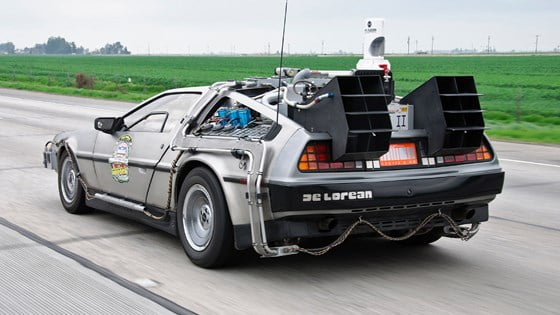
If you’re gonna build a time machine into a car, why not do it with some style? And if you’ve just not been able to find quite the right car to use, well, the US-based Delorean Motor Company might have just the ticket.
Yes, that’s right; DMC is planning to restart production of the classic stainless-steel-bodied DMC-12 in 2017. It’s not the old DMC we all know and love, though – the US company doesn’t have any affiliation to the original manufacturer. It shares the same name but was otherwise born out of supplying DeLorean owners with new and old-stock parts alike.
It’s been able to make a success of what might have otherwise been a limited business because, in 1997, it bought a vast inventory of original DeLorean parts. They were left over from the company’s original production runs and enabled the company to establish itself and, with so much stock on hand, continued sales haven’t been a problem. It’s also developed its own products, including upgrades, to further support current owners.
DMC even has the rights to the original company’s name, logo and trademarks, as well as a range of engineering drawings. This makes it ideally positioned to reproduce the original car, which was made famous by its appearance in the Back to the Future series of films.
Why bring the DeLorean DMC-12 back now?
In the US, the National Highway Traffic Safety Administration had applied the same rules and restrictions to both big automotive manufacturers and low-volume specialists alike. That meant that the small manufacturers had to meet the same regulations as the high-volume ones, which simply wasn’t possible in most instances – in short, they ended up not being able to sell turn-key registered cars, only kits that would be assembled by the new owners and registered independently.
A change to the legislation, however, now means that low-volume manufacturers can now build replicas of cars that existed 25 years or more ago, without having to meet all the new regulations – and they can sell the car as a complete going concern. The newly built replicas will still have to meet emissions restrictions – easily done by taking a new powertrain from another manufacturer – as well as carry out recalls when necessary, however.
In an interview with Click2Houston, DeLorean CEO Stephen Wynne said: ‘It’s fantastic. It is a game-changer for us. We’ve been wanting this to happen. That was a green light to go back into production.’
DMC also released the following statement: ‘In anticipation of the Low Volume Manufacturing Act, we have been working for some time to identify a supplier for engines and other parts that must be reproduced to allow production for 2017.
‘A number of hurdles exist before production can begin, and we’re still early on in this process of determining the feasibility of moving forward.’
Building the replicas will also allow DMC to use up some stock that will otherwise sit on the shelf indefinitely, helping bolster its business. Additionally, it may have to tool up to produce some new panels or parts for the planned production run of DeLoreans, which will further benefit existing owners and generate more business.

A new engine, then? And just how many can DMC build?
In an interview with Hemmings in December 2015, DMC’s vice president Jim Espey said that the company ‘has enough parts to build 500 cars.’ In more recent stories, however, a figure of 300 has been quoted.
The company has remanufactured DMCs before, stripping them down and rebuilding them from the ground up, but this time around each car will be built from new. Original parts will be used where possible and relevant, while new parts will be substituted if appropriate.
One key change for the ‘new’ DeLorean will be with respects to its powertrain. In order to be legally sold it’ll have to meet emission regulations, entailing a new engine. At the moment, the company appears to be cueing up a naturally aspirated 3.7-litre V6 – most likely from Nissan. That’d result in a similar character, albeit more powerful, to the original 2.8-litre PRV-engined DeLorean. Countless V8 options are also on hand but those would likely require the car itself to be significantly modified to suit.
A lot of hurdles remain, however, including sourcing a suitable transaxle, as well as brakes, suspension, electronics and more. Any tooling required to produce new panels, if necessary, would also set the company back a considerable amount.

What will one of these ‘new’ DeLoreans cost me, then?
If DMC’s production plans pan out, expect to pay $100,000 – around £70,000 – for a newly built DeLorean. You’ll have to really want one, given that makes it £15k more expensive than a Porsche Cayman GTS – although that’s somewhat a moot point – but no doubt there will be collectors and fans out there who would gladly pay the premium. Each will benefit from modern creature comforts, too, helping justify the price tag.
It’s worth bearing in mind, however, that you could buy an excellent example of an original – and collectable – DeLorean DMC-12 for around £30k. The new cars, while unquestionably appearing just the same, will be marked as replicas and differ mechanically and electronically from the originals, too – so while they’ll be far more usable, they won’t necessarily have quite the same appeal.
You might have a bit of a wait on your hands if you want a new one, mind; DMC suggests that the first new DeLorean replica may arrive in 2017, although a date of 2020 had previously been mooted for the new replica sports car.
The original DeLorean Motor Company, which is remembered primarily for its gull-winged DMC-12, was founded by John DeLorean in 1975. Unfortunately, it went bankrupt in ’82, following cost overruns, poor sales and a weak exchange rate between the US and UK.
In the end, DeLorean himself was arrested following his entanglement in a multi-million drug trafficking deal – charges from which were all later dropped. The damage was done, however, the investment dried up and the company’s factory was quietly shuttered. Still, it managed to churn out some 9000 of the stainless-bodied wonders in the two years the production line ran for. There were even plans for a saloon version.
[“source-carmagazine”]





